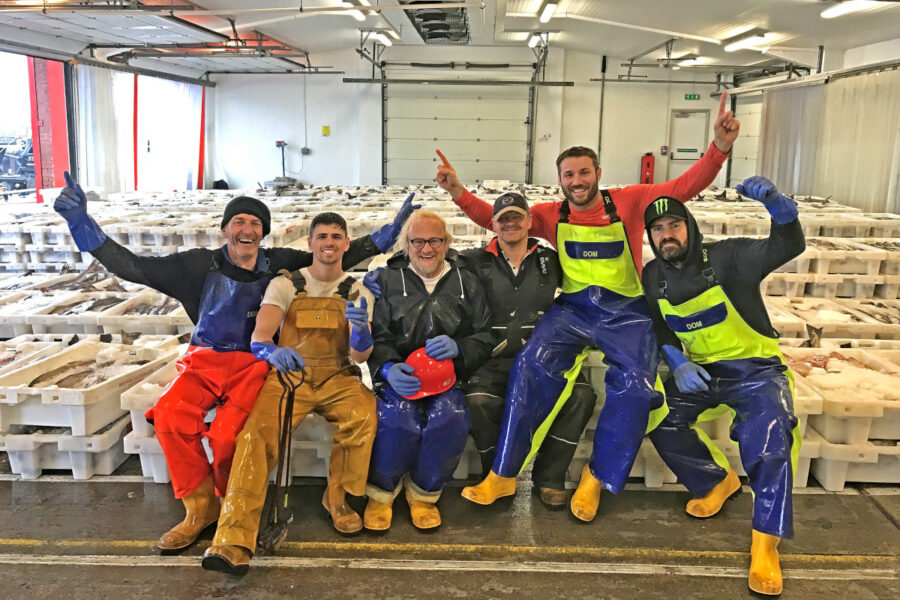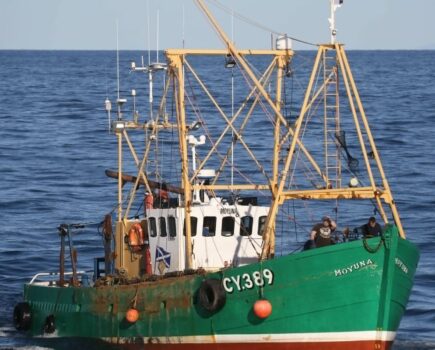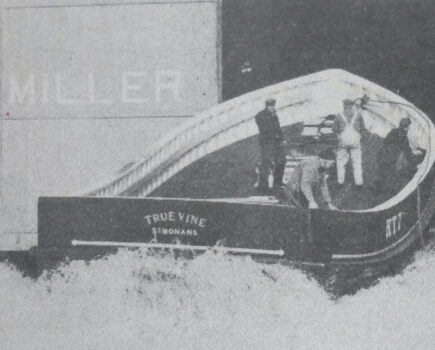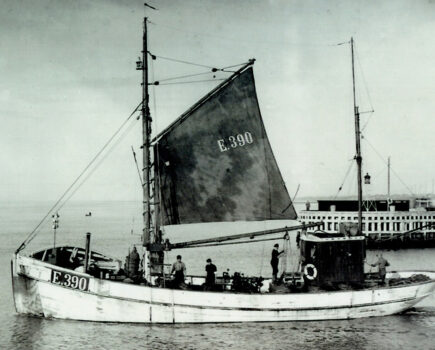In at the deep end
Three well-known celebrities from very different backgrounds – chef Antony Worrall Thompson, Boyzone’s Shane Lynch and former England World Cup-winning rugby player Ben Cohen – were thrown in at the deep end at the start of this month in Channel 5’s new TV documentary, Trawlermen: Celebs At Sea, reports John Periam
Broadcast from 9-11pm on Monday 1 and Tuesday 2 July, the programme has been described as Channel 5’s most dangerous reality series, and was widely acclaimed by viewers. Over 1.1m people were reported to have watched the first episode – which was broadcast on the same day as a small fire was quickly extinguished in the fishroom of featured vessel Genesis, while it was tied up for maintenance work.
The three celebrities joined skipper Alan Watt and the crew of the 27.5m twin-rig trawler Genesis BF 515 at Macduff for a 10-day trip fishing in the North Atlantic.
Well-known chef Antony Worrall Thompson spoke to Fishing News about his trials and tribulations as a budding trawlerman, and about his thoughts on the fishing industry. The series was recorded almost a year before it was screened.
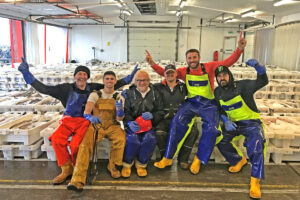
Job done – the three proven ‘chance shots’ with the crew of Genesis, after landing their catch on Scrabster market.
Before he was approved to take part, Antony, together with Shane Lynch and Ben Cohen, went to Bristol to be put through various tests, including swimming and a medical, which he passed with flying colours.
“Before we left the harbour, a lot of time was given to the safety onboard, and where the relevant gear was stored for ease of access. PFDs were mandatory at all times on deck, and we were given extensive conducted tours of the trawler. This was important, as we quickly found out that there was a lot of difference when working at night. We were also monitored by the full-time crew members when working. One must also remember that we had a film crew of three onboard as well, which, at times, took up valuable working deck space.”
All three celebrities were heavily involved in their working roles, which were mostly made up of a five-hour working cycle. This included shooting/hauling the twin-rig gear, sorting and gutting the catch, and boxing fish in the fishroom.
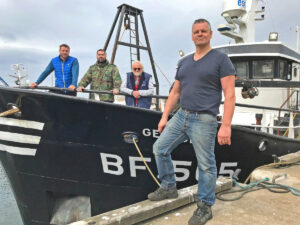
Genesis skipper Alan Watt welcomes Ben Cohen, Shane Lynch and Antony Worrall Thompson.
“Touch wood, I did not have any issues relating to seasickness, unlike Ben, who had a few problems. Perhaps my mind was occupied more, as after the first day, I took over my new role as cook.
“Fish was always top of the menu; however, the crew did make sure that the freezers were well-stocked before they set sail. It is very hard work, and we all ate very well indeed. By the end of the trip, I was able to stand with my legs apart in storm conditions without any major worries.”
“Sleeping onboard was fine. The regular crew took short sleeping patterns of two hours at a time.” Antony found that he could sleep better when it was dark – he reckons he only achieved 33 hours’ sleep in the whole 10-day period.
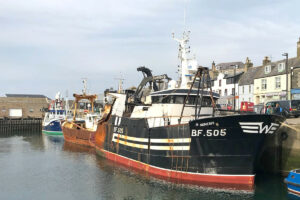
Genesis waiting for the tide to come, before sailing from Macduff harbour.
With six extra crew onboard, space was a little limited at times. They had to be careful with water, and showering was limited to one a week. “I may have hummed a bit, and very rarely got out of my clothes,” said Antony with a smile. He also recalled a toilet blockage which caused some amusement – they never established who used the baby wipe.
When filming, one must be aware of what the cameraman needs. “I found the crew to be adaptable and considerate when we were filming, especially when hauling the nets and using the heavy winching gear. This we left to the professionals to manage, due to health and safety regulations.”
When it came to uncomfortable situations, Antony felt that going down into the hold to box and ice fish was the one he enjoyed least of all. It was a steep ladder, with a bit of a ridge to get onto it. Hauling the nets in was fine, and Antony had his regular position near the hold to steady the nets. “I did not mind the rough seas – I had a bit of a ‘Titanic moment’ and wanted to stand with the waves crashing over me, but they would not let me do that.”
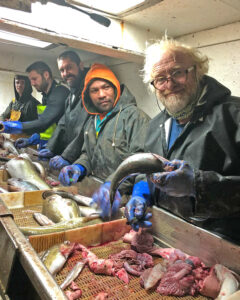
The celebs in action at the gutting table.
PFDs were worn, but no harnesses. There were several issues relating to nets getting caught on the bottom, and trawl doors getting jammed. “On these occasions, I could really see how the professionals coped. Alan, the skipper, did an amazing job of keeping everything under control – he was very reassuring when it came to managing the crew and the three of us. A pat on the back meant so much when we got things right.”
Antony has two restaurants, The Greyhound in Henley-on-Thames and the Kew Grill in Richmond. “We try to include fish on our menus, and this is brought up from Brixham. The series has really encouraged me to source my fish from a proper wholesaler. I think when it comes to filleting, my working skills will have improved,” he said with a smile.
Making this series has certainly given Antony a different perspective on the UK fishing industry. “I was appalled at the rules and regulations. The quota system and the amount of fish being returned to the sea – especially cod – I found to be very wrong. What is the point in that?”
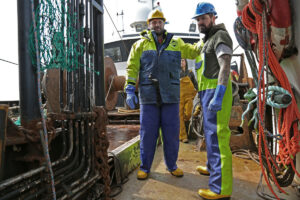
Ben Cohen and Shane Lynch ready for the next haul.
All three celebrities were unhappy about this, as was noticeable on the programme when it came to gutting the fish. There was one net haul that contained a lot of cod that had to be discarded. Ben Cohen was very upset, and fully endorsed the others’ comments.
Antony shared his concerns in more detail. “Now that this programme has gone out, I, with Alan and other trawler skippers and owners, want to get together with the powers that be to make them more aware of our worries. Why are outsiders being allowed in to destroy this industry? Sustainable fishing is what it is all about. Some days we had to destroy more than we were allowed to catch – that, to me, does not seem right!”
In one port, a Spanish vessel came in at night-time and loaded its catch straight onto a lorry. The boxes were covered, and there were no visible inspections at all – and off it went via road to Spain. Antony was so annoyed that he went around trying to take some photos, but was told to move away. “On our boat, they checked every box for fish size and weight, and did nothing on the Spanish one – that is not right.”
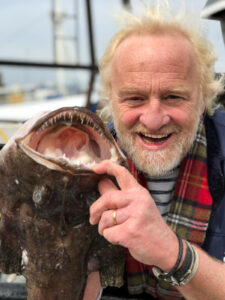
Antony Worrall Thompson wondering what he might cook for supper – monkfish, possibly!
At sea, there were several foreign vessels working. Speaking to the crew of Genesis, Antony was told of their worries, but they said that while in the EU, there is little they can do. As a result, they feel they are being inspected more by the authorities.
Another thing Antony noticed was the lack of youngsters working onboard.
“There is money to be made in fishing – but there are so few boats that they are not being attracted to go into the industry. Change is needed, and we must be able to control our own waters again. Ours are being raided, and everyone is just putting two fingers up to Britain.
“Some foreign vessels don’t even have a harbour to operate from, yet put a flag up giving them rights to fish under the EU regulations. It is so wrong! We need to give our own fishermen an industry back, before it disappears.”
Would you go back again, asked Fishing News? “Yes! I loved it. I may have been the eldest, but I made a concerted effort to not let this hamper me. There was a close working bond, and everyone got on so well – there were three age groups onboard, ranging from mid-60s to late 20s, all supporting and helping each other.
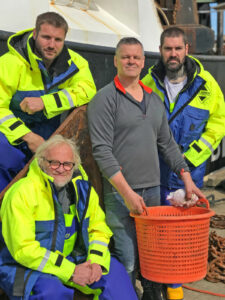
The newbies kitted out with their safety gear prior to sailing.
“I am one of those people, when it comes to education, that if I don’t want to learn it, I find that, at times, it is not easy to pick things up. On this occasion it was different – I had fun times, and I made myself enjoy it. It is incredibly hard work. After their deck duties, three crewmen have 2,000kg of fish to gut, then back on deck again, with little time to spare over 10 working days. They have to work very hard to earn their money.
“I came back full of deep admiration for the fishing industry, and I really hope that in the near future, something can be done to give them back the life they deserve, instead of turning a blind eye to it. We will see.”
Teamwork overcomes initial concerns
Genesis skipper Alan Watt said: “We had huge concerns when approached about making this series.
“The first issue was safety concerns regarding unqualified celebrities on the deck of a fishing trawler, and the second was how it would reflect on the industry – after all, the media hasn’t always worked in our favour at times in the past.
“One of the main issues I was afraid of was the West of Scotland cod – an issue that has been a thorn in the side of every fisherman who fishes in the Western Waters. The last thing I wanted to see was cod, but typically, they were everywhere!
“I’ve read tweets that suggest we were targeting cod, but the truth is that we covered about 200 miles from where we started trying to avoid cod. I could see that the newbies were sickened by the sight of this, but no one was more sickened than myself.
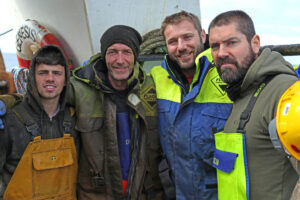
Genesis crewman Phil Watt and mate/relief skipper Jamie Gordon with Ben Cohen and Shane Lynch.
“Since the making of this programme, the landing obligation has kicked in for the Western Waters, disallowing vessels to dump cod west of the 4° line, while also working a 5% by-catch for cod. There’s a lot of confusion around the regulation at the moment, as one regulation contradicts the other, leaving skippers confused as to what they should do – however, we welcome the effort Marine Scotland is making to try to get a viable TAC on the fishery.
“In my opinion, there needs to be a proper stock assessment done on West Coast cod, separating two areas, one to the south of a line east and west of the Butt of Lewis, and another to the north of that line, and creating two separate West Coast cod TACs. It’s not something that will change overnight, which makes it more crucial that it should be done as soon as possible.
“Apart from a little negative feedback on the cod, the positive feedback on the programme has been overwhelming, showing the public exactly what it takes to get the fish from sea to plate. I think the concept was great – not only watching fishermen, like in previous programmes, but getting hands-on too, feeling the cold and the tiredness, smelling the smells, knowing that the reward at the end depends on how hard the skipper and crew are working, and fearing that it could all be for nothing at the end of the day.
“I have to admit that at times, the health and safety issues were so difficult that I could have given up, but we pushed ahead. Thanks go to Sunderland Marine for having the guts for taking on such a brave concept. Without their support, I have to wonder if it ever would have happened.
“Accommodating six additional crewmen on Genesis was challenging, but everyone was determined to make it work and came onboard with a can-do attitude, which was maintained throughout the trip.
“I also have the greatest respect for the director, camera and sound crew. After a hard day’s filming, the rest of the crew went to their beds for a sleep, while these guys had to stay up looking at the day’s footage, and preparing files and battery packs for the following day.
“Cameraman Ted Gifford has worked on the Blue Planet and Frozen Planet filming for David Attenborough, all over the world, from Antarctica to Siberia in the most severe conditions, yet he told me it’s probably the hardest thing they had ever done.”
Detailed preparation nets positive end result
Matt Cole of Keo Films, the executive producer of Trawlermen: Celebs at Sea, commented: “When the tide at Macduff harbour is falling fast and Alan Watt wants to get to sea, he’s not the kind of man to wait around. So when our three celebrities reported for duty an hour late, he was far from happy. I knew that Alan was already worried about the trip, and now his anxiety levels had just hit a new high.
“The process had all started six months earlier, when Channel 5 asked if it would be possible to make a series with celebrities learning to be trawlermen. Alan was one of the first people we contacted to ask for a bit of advice. Pretty soon, we realised he was the skipper we’d want to work with. But he was less convinced.
“His big worry was that the programme might open up a debate on quotas, by-catch and discards. He just wasn’t going to be part of anything that could negatively impact the livelihood of hardworking trawlermen, and he had little faith that TV would protect their cause. But in the end, Alan’s concern for the future of the industry was the bedrock that our series was built on.
“As Alan told me when I met him at Macduff, he wanted people to know ‘what it really takes to get that fish onto their plate’.
“That married perfectly with what we wanted for the series. Even though we were putting celebrities on the boat, we weren’t interested in making a fake reality show. Their experiences as crew would show people the real nuts and bolts of the job, and let them understand how tough it really is. But it needed a skipper like Alan to enable us to do that properly, safely and honestly.
“After the series had aired, we saw feedback from people saying it was the most interesting and informative TV series about fishing that they had seen. That all comes down to the hard work that Alan put into helping us get it right.
“But first, there were months of painstaking details to be sorted out. Our production manager Stella Stylianos had worked on BBC’s Trawlermen, so she knew her way around maritime insurance and safety at sea. Together, she and Alan went into the zone, and didn’t reappear until the project was finally insured.
“Due to the number of berths below decks, our production crew (camera/sound team) was limited to three. So it was crucial to find people with proven sea legs. Putting it brutally, if the celebs were going to be sick, we wanted to be sure that at least one of our guys was still standing to film them! Three days into the trip, when Genesis hit a gale, everyone’s stomachs got a true test. And to the crew’s credit, not one of them went down. To my slight disappointment, though, neither did any of our celebs.
“Our camera team had experienced some very challenging locations, from longline fishing vessels on the Southern Ocean, to canoes along the Amazon. But they were unanimous that this was the toughest thing they’d done, by far. At the end of 12 days, they had filmed 400 hours of material, to be edited into the four hours of television that eventually aired on Channel 5.
“Shane, Ben and Antony were chosen because they wanted to experience the job, for real. And it’s just as well. Alan treated them as genuine newbies, with no airs and graces. So it was good to see that the audience responded so warmly to the way they stuck to their task. But what made it more special was that they earned the respect of the crew.
“By the end of the trip, as they unloaded their catch at Scrabster market, the boxes were sliding across the floor and everyone was smiling. They looked almost like real trawlermen. We wanted to show the reality of the job. And it’s a credit to everyone involved that along with the hard work and gruelling shifts, we also got to see the teamwork and the banter that’s such a big part of life on Genesis.”

